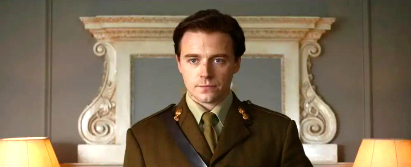 Terence Davies dramatizes the remarkable life of the World War One poet Siegfried Sassoon, weaving back and forth in time to show how much he and others like him lost because of war.
Terence Davies dramatizes the remarkable life of the World War One poet Siegfried Sassoon, weaving back and forth in time to show how much he and others like him lost because of war.
For many modern historians, the First World War, from 1914-18, has a special significance, as the point at which an older version of civilization fell apart. In British thought and memory it sometimes has the character of an unhealed wound. Almost 900 thousand young British soldiers died, about 6% of the adult male population. It was as if the flower of English youth had been cut off. In the writings of the poets who fought in that war we still read passionate urgency. Siegfried Sassoon was one of those poets. His father was of Iraqi Jewish descent, his mother a Christian. He was not of German ancestry; his mother chose the name Siegfried because of her love of the music of Richard Wagner.
English director Terence Davies has largely focused in his films on exploring and recovering personal and cultural legacies. In his latest film, Benediction, he tells the story of Siegfried Sassoon, not in a straightforward or linear fashion, but as a weaving back and forth in time, a recapturing of Sassoon’s experience that takes into account his loves and strengths, but also his mistakes and failures.
Incredibly courageous, loved and trusted by the men who served with him, Sassoon, played beautifully as a young man by Jack Lowden, was decorated for bravery and recommended for the Victoria Cross. But when we meet him in the film, he’s caused a sensation by publishing an open letter, what he called “a soldier’s declaration,” denouncing the conduct of the war and saying he would no longer fight. Instead of being court-martialed he was sent to a psychiatric hospital. In an early scene, he argues with a close friend, the prominent critic Robbie Ross, played by Simon Russell Beale, because Ross had pulled some strings to prevent Sassoon possibly being shot. Sassoon wanted to put his life on the line to oppose the war, but Ross simply wanted his friend to survive. In the hospital, Sassoon meets Wilfred Owen, another poet, and the impact Owen has on his life, both as a poet and as a gay man, is decisive. Wilfred Owen went back to his unit after being pronounced cured by psychiatrists, and he died only a week before the Armistice.
The film covers Sassoon’s tumultuous life after the war, as a member of the London artistic scene in the 1920s, intercut with scenes of him as an older man, now played by Peter Capaldi, still bitter about the war and about his personal failures, and ultimately turning to the Catholic Church in search of some kind of meaning.
In the 1920s, gay life in the London art scene was barely closeted—it was quite evident to anyone who could see, yet no one talked about it publicly. Davies presents us with the sometimes very funny, but also painful, episodes of backbiting and cutting wit on the part of Sassoon and his lovers, including the musician and actor Ivor Novello, with a malicious personality, and the decadent aristocrat Stephen Tennant, self-centered to the point of abuse.
Terence Davies is openly gay himself, and here he succeeds in presenting an historical portrait of gay relationships in a specific English time and place, without holding back. Sassoon got married eventually and had a son, but in the scenes with him as an old man, we can sense that there’s still an emptiness inside that may never be filled. Why is that? At film’s end, in a sequence of almost unbearable poignance, we find out. I cried at the end of Benediction, a film in which personal and historical tragedy embrace.

Tarkovsky’s epic film uses the legend of Russia’s great icon painter to explore urgent questions of art, faith, and suffering. On any film buff’s...

The guests at a wealthy dinner party find themselves unable to leave the premises, in Luis Buñuel’s satiric fable. Spanish director Luis Buñuel went...

The Big Sick, based on the actual events surrounding comedian Kumail Nadjiana’s courtship of his wife Emily, is consistently funny. Actor and comedian Kumail...